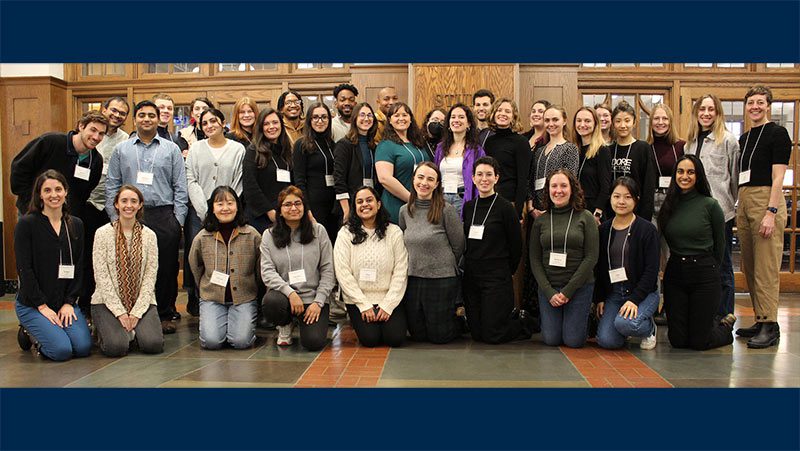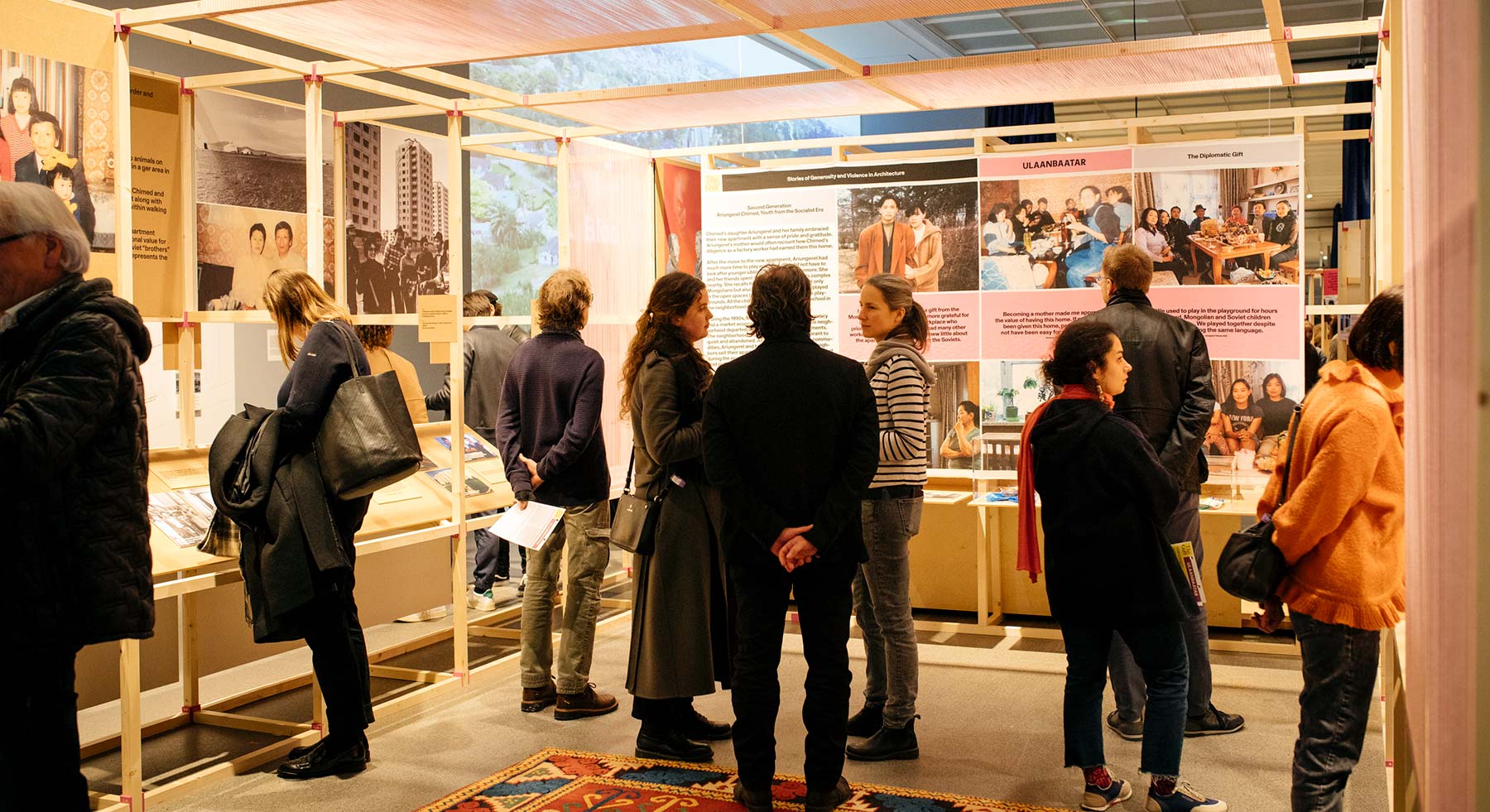Several Taubman College students have been named 2023 Dow Sustainability Fellows or are members of teams recognized with Dow Distinguished Awards.
The Dow Sustainability Fellowship supports “the next generation of sustainability leaders in business, government, and nonprofits by promoting interdisciplinary and collaborative engagement.” The 2023 fellowship cohort comprises 33 students from 10 of the University’s 19 schools and colleges, and seven students are from the Taubman College of Architecture & Urban Planning.
“This high participation rate of Taubman students reflects the strength of our academic community as well as a shared commitment to engaged learning within the realm of sustainability,” said Jen Maigret, Taubman College associate professor of architecture and Dow Fellows Program director. “The positive impact of their fellowship work will be felt not only by their community partners but will also strengthen our own College as these students expand our connectivity with the larger University and share important interdisciplinary collaboration skills with their architecture and urban and regional planning colleagues.”
Dow Sustainability Fellows
Brianna Bartelt, a master’s student in architecture, is interested in adaptive reuse and vernacular architecture.
“While sustainability is a constant theme throughout the Master of Architecture program at Taubman College, my understanding of the issue is inherently limited by the perspective of a single field of study,” said Bartelt. “Having the opportunity to leverage the full spectrum of studies of the university, from public health to sociology, in an interdisciplinary environment will be transformatively educational. It is one thing to understand how to make a building climate resilient in the abstract, but it is another to understand how those designs are healthful for occupants or if our economic systems are prepared to create such buildings en masse.”
Izzy Beshouri, a master’s student in urban and regional planning, wants to demystify the planning process to better engage community input, especially when it comes to climate change and adaptation.
“The climate crisis is real, and it is human,” said Beshouri. “The stakes make our lived experience just as relevant as the professional and academic backgrounds we bring to the table. The Dow Fellows program convenes students at all different stages of life, adding another dimension to the visionary potential of interdisciplinary work. I am eager to iterate on my urban planning curriculum working with students from other colleges, learning how they chose their disciplinary arena in which to fight for climate justice and synergizing our efforts within one just transition. As a planner, it is critical that I can facilitate collaboration across different fields.”
Natalie DeLiso, a master’s student in architecture, aspires to use social sciences and a lens for architectural design to foster positive change for communities and individuals.
“We must leave the sustainability silo and embrace the reality that understanding how individuals experience the built environments is integral to achieving successful outcomes,” said DeLiso. “This shift to interdisciplinary approaches is the best path to a more sustainable and equitable future. There are several examples of affordable housing projects being torn down because of unsafe living conditions or the latest technology for passive design in offices causing individual discomfort. At what cost does this come from both an embodied carbon perspective and an equity perspective? The collective emissions of these failed attempts are one component, and so is the time spent in unhealthy or unproductive environments for the individuals. We have been experimenting with human lives and testing our planet long enough to begin to know better – now it is about compiling and creating frameworks for all industries to work harmoniously together.”
Emily Huhman, a master’s student in urban and regional planning, is passionate about building sustainable and affordable homes.
“My experience in affordable housing case management and supportive services coordination taught me how difficult it is to convince developers to put sustainability at the forefront of affordable housing work,” said Huhman. “Building a framework to prioritize sustainability can aid me in advocating for the short- and long-term benefits of sustainability to landlords and developers. The Dow Sustainability Fellowship will provide the opportunity to collaborate with talented students to build a structure for considering the impacts of my career field on sustainability and how I can think critically about centering sustainability in addressing the affordable housing crisis.”
Griffin Sproul, a master’s student in urban and regional planning, came to Taubman College intending to develop a deeper understanding of the strategies available to create more sustainable and just built environments.
“My favorite feature of the Dow Sustainability Fellowship program is the service learning model,” said Sproul. “I believe scholars have a moral obligation to mobilize their network and organizational power to contribute to solving real-world sustainability challenges. Sustainable solutions often require technical expertise communities alone do not have, or do not have the capacity to achieve independently. Resilience is a result of the connections between people as much as it is our technically driven climate adaptation technologies and policies.”
Revati Thatte, a master’s student in urban and regional planning, is focused on building electric vehicle (EV) infrastructure.
“Through cross-team collaboration and professional mentorship, I believe the Dow Sustainability Fellowship will prepare me to navigate the complexities of sustainability work, especially in the automotive industry,” said Revati. “Transitioning to clean energy transportation isn’t solely an urban planning or engineering endeavor — there are elements of environmental science, law, economics, and more that contribute to a successful outcome. Immersing myself in a project that requires all of these fields working in concert will undoubtedly transform how I approach sustainability work throughout my career.”
Brooke Troxell, a dual degree master’s student in urban and regional planning and environment and sustainability, believes fostering circular economies is a great way to engage many different cultures, communities, businesses, and organizations into collaborative, localized, sustainability-focused problem-solving.
“My MS capstone project for my degree in Environmental Justice is working with a team of students to help the City of Ann Arbor develop a city-wide circular economy strategy. The goal of this strategy is to help transform Ann Arbor into a zero-waste community in order to achieve the carbon neutrality goals set forth in the Office of Sustainability and Innovation’s A2Zero plan. The opportunity to dive into a new circular economy project and utilize my current circular economy experience to collaborate with a talented, interdisciplinary team will truly be a transformative educational experience that would not be possible without the Dow Fellows program. This is a unique opportunity to hone robust skills and make me competitive in the urban planning job market,” said Troxell.
Dow Distinguished Award
Sarah Dobie, a doctoral student in urban and regional planning; Lesli Hoey, associate professor of urban and regional planning; and Lanika Sanders, doctoral student in urban and regional planning, are members of the team Advancing Sustainable and Equitable Agrifood Systems in Michigan: Scenario Analysis of Multiple Approaches to Circularize the Nutrient Economy. They will “examine how circular nutrient systems—a bold alternative to the status quo—could minimize ecosystem degradation, reduce greenhouse gas emissions, increase self-sufficiency in the agrifood system, and ultimately ensure a sustainable, equitable, and secure food system. The team will conduct a nutrient flow analysis to quantify the major nutrient flows (N, P, and C) for the lower 50 counties in Michigan, comparing business-as-usual conditions to scenarios employing nutrient recovery approaches.”
Lingxiao Du, a master’s student in urban and regional planning, is a member of the team Pursuing Long-Term Sustainability of Green Infrastructure From Social and Economic Perspectives. They “will identify major social and economic factors that affect green infrastructure performance, investigate associations between these factors and hydrological performance with a multilevel logistic regression model, and develop a behavior experiment model to examine public acceptance and willingness to install and maintain green infrastructure under different scenarios of stormwater policy. Based on this work, the team will suggest policy guidelines to promote the long-term sustainability of green infrastructure.”





